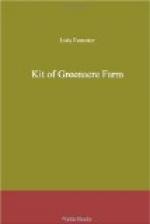“Haven’t you got some of that painted tinware, too, Sally?” she asked. “I don’t know just what you call it, but I mean the black candlesticks and little trays with trailing vines on them. I’d like to put some of those around.”
The very next day Helen started off with Piney on the trail of old candlesticks. They stopped at nearly every house they came to, and returned with a perfect treasure trove of old relics.
“Why, we found candlesticks stuck out in wood-sheds and corn-cribs, rusty as could be, but the real thing in colonial art, and mother,” Helen added, almost lowering her voice with a touch of awe, “what on earth do you think Mrs. Parmalee had on her hen-house door? This!”
She held up an ancient brass knocker, a smiling faun’s head encircled in wreathing vines.
“That doesn’t look as if it ever belonged on a Puritan’s front door,” said Mrs. Robbins, laughingly. “I rather think it must have come from Merry Mount, where they held the first Maypole dance and shocked good Cotton Mather. I think I’ll have to buy that from Sally myself.”
There were several old lacquered trays and a couple of old gray stone dasher churns.
“We’ll take those and fill them with yellow daisies,” Piney said, admiringly, “and I’ll bet a cookie they’ll sell the first day to some of the artist crowd. I found them in the Bennetts’ smoke-house covered with the dust of ages.”
It was little things like these that made Sally’s shop unusual and inviting, but Piney started a new venture herself accidentally. She and Sally had always been chums, and now she spent most of her time helping her. It became the order of the day for them to have a cup of tea about four o’clock. Piney would take a candle-stand by the west window and make it look so inviting with a little strip of homespun linen and a spray of flowering almond that no one could resist tea from the old blue ware which Mrs. Peckham had donated.
They were just having tea one afternoon when Miss Emery came in with the girls from the Academy in New York. There was Frances, and the two Farley sisters, Gwen and Elise. The other girl was Cecil Fanshawe. Kit had a way of summing up family history with a few brief, terse remarks, and she had all four indexed and filed, so to speak.
“Cecil’s from Fanshawe Grange, somewhere in Middlesex, England. Father’s a Major in France, mother’s dead, got two aunts in New York. Gwen and Elise come from Ohio, got French blood from colonial days. Frances is old Knickerbocker stock, born on Washington Square, warranted sterling. I like Cecil best.”
When they discovered the tea-table that afternoon, Miss Emery insisted that she would not leave until she had partaken also from the willow pattern cups, and Sally, all blushes and smiles, prepared her first guest tea.
After they had gone she looked at the seventy-five cents in her hand, as though it had fallen from the sky, but Piney took the cue from Fate.




